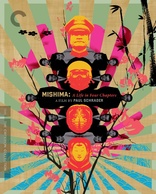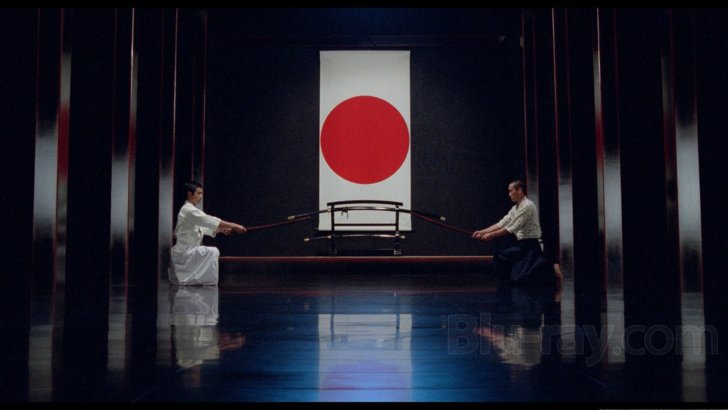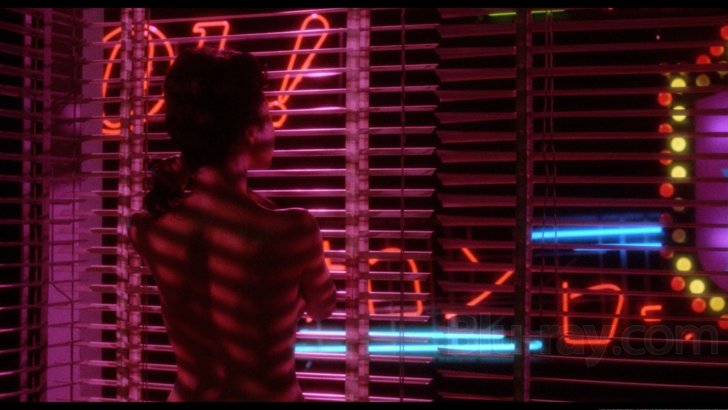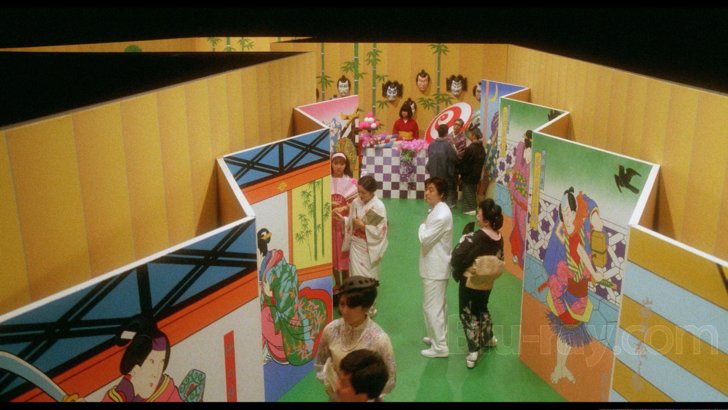Mishima: A Life in Four Chapters Blu-ray Movie
HomeMishima: A Life in Four Chapters Blu-ray Movie 
Director's CutCriterion | 1985 | 121 min | Not rated | May 22, 2018

Movie rating
8.3 | / 10 |
Blu-ray rating
| Users | 0.0 | |
| Reviewer | 4.5 | |
| Overall | 4.5 |
Overview
Mishima: A Life in Four Chapters (1985)
A portrait of the acclaimed Japanese author and playwright Yukio Mishima that investigates the inner turmoil and contradictions of a man who attempted the impossible task of finding harmony among self, art, and society. Taking place on the last day of Mishima's life, when he famously committed public seppuku, the film is punctuated by extended flashbacks to the writer's past as well as gloriously stylized evocations of his fictional works.
Starring: Ken Ogata, Toshiyuki Nagashima, Ryô Ikebe, Masayuki Shionoya, Hiroshi MikamiNarrator: Roy Scheider
Director: Paul Schrader
| Drama | Uncertain |
| Foreign | Uncertain |
| Biography | Uncertain |
Specifications
Video
Video codec: MPEG-4 AVC
Video resolution: 1080p
Aspect ratio: 1.85:1
Original aspect ratio: 1.85:1
Audio
Japanese: DTS-HD Master Audio 2.0
English: DTS-HD Master Audio 2.0
English: Dolby Digital 2.0
Subtitles
English
Discs
Blu-ray Disc
Single disc (1 BD)
Playback
Region A (locked)
Review
Rating summary
| Movie | 4.0 | |
| Video | 5.0 | |
| Audio | 5.0 | |
| Extras | 5.0 | |
| Overall | 4.5 |
Mishima: A Life in Four Chapters Blu-ray Movie Review
Reviewed by Dr. Svet Atanasov May 31, 2018Paul Schrader's "Mishima: A Life in Four Chapters" (1985) arrives on Blu-ray courtesy of Criterion. The supplemental features on the disc include a vintage trailer for the film; archival audio commentary with Paul Schrader and producer Alan Poul; archival documentary about the production history of the film; and a lot more. The release also arrives with a 58-page illustrated booklet featuring an essay by critic Kevin Jackson, a piece on the film’s censorship in Japan, and technical credits. In Japanese, with optional English subtitles for the main feature. Region-A "locked".

Warriors
The two words that best describe the man whose journey is chronicled in Paul Schrader’s film are patriot and radical. Of course, he was also a brilliant author, but his work served as a conduit for the political ideas that gave purpose to his life. It is why, at one point, the clear line that once separated the reality that he crafted in his writings and the reality in which he existed vanished.
The entire film functions as a mirror that reflects the evolution of these ideas in this quite unusual environment where the mind of Yukio Mishima (Ken Ogata) felt at home. It has a structure, but in it time is rarely as important as beauty and elegance. Unsurprisingly, very large sections of the film feel like gigantic, fluid dreams a great surrealist master would have been proud to describe in his final novel.
The four chapters referenced in the title of the film channel different aspects of the frustration that will ultimately end Mishima’s life. At its core is an unshakable conviction that an ongoing post-war transformation is irreversibly eroding the cultural identity of Japan and reshaping its people into docile consumers without self-preservation instincts. Different events are then selected to highlight the growing intensification of Mishima’s frustration and his inevitable radicalization.
The blending of radical political statements and surrealist visuals does give the film a certain Godard-esque quality, but it is not of the abstract type that makes quite a few of the iconic French director’s post-New Wave projects look like odd, often delusional lectures. In fact, it emerges only as the single layer of something much bigger and more complex, where Mishima’s genius is summed up. In other words, the film is not an audacious attempt to explain Mishima, but an invitation to look in the proper direction and from the right angle where an outsider could discover some meaningful answers.
The production history of the film is quite interesting, and all these years later could very well be the subject of a fascinating new documentary. Schrader and his brother Leonard co-wrote the script (with help from his wife Chieko) and it was thanks to executive producers Francis Ford Coppola and George Lucas that the film materialized. However, in Japan plenty of influential figures were openly hostile to it and during the ‘80s it was essentially denied proper theatrical exhibition.
Also worth mentioning is the fact that various versions of the film have been distributed on home video. Early international releases, for instance, have had certain scenes removed. Also, there are alternate versions with different narrations, with the most popular one done by Roy Scheider.
Criterion’s Blu-ray release features a brand new 4K restoration of the Director’s Cut of the film, supervised and approved by Schrader and cinematographer John Bailey. Also, it includes the Scheider narration, as well as a second edited voice-over version.
Mishima: A Life in Four Chapters Blu-ray Movie, Video Quality 

Presented in its original aspect ratio of 1.85:1, encoded with MPEG-4 AVC and granted a 1080p transfer, Paul Schrader's Mishima: A Life in Four Chapters arrives on Blu-ray courtesy of Criterion.
The following text appears inside the booklet provided with this Blu-ray release:
"Supervised and approved by director Paul Schrader and director of photography John Bailey, this new 4K digital transfer was created on a Lasergraphics Director film scanner from the 35mm original camera negative at Roundabout Entertainment in Burbank, California, and restored by American Zoetrope, with additional restoration performed by the Criterion Collection. Thousands of instances of dirt, debris, scratches, splices, and warps were manually removed using Diamant-Film Restoration and MTI Film's DRS, while Digital Vision's Phoenix was used for jitter, flicker, small dirt, grain, and noise management. The 2.0 surround soundtrack was remastered from the 35mm magnetic printmaster. Clicks, thumps, hiss, hum, and crackle were manually removed using Pro Tools HD and iZotope RX. Please be sure to enable Dolby Pro Logic decoding on your receiver to properly play the Dolby 2.0 surround soundtrack.
Transfer supervisor: John Bailey, Paul Schrader, Lee Kline.
Colorist: Gregg Garvin/Roundabout Entertainment; Lee Kline.
Digital restoration: James Mockoski, Robby Schaffer/American Zoetrope.
Digital imaging: Giles Sherwood."
The 4K restoration is an absolute stunner. I did some random comparisons with my DVD release and there are entire sections where it feels like a veil has been lifted and the film's true qualities are finally revealed. In terms of depth and clarity, the improvements are simply extraordinary. I actually took two specific screencaptures to show just what a dramatic difference in quality there is in the corresponding segments from the DVD release. The first is the segment where the young lovers make love under the heavy red/neon lights (see screencapture #2), while the second is from the exhibition with the period drawings (see screencapture #5). The entire film also has a vastly superior color palette now, and as a result the surrealist footage is even more striking. The black-and-white footage also has a more convincing organic appearance. There are absolutely no traces of problematic digital corrections. Image stability is excellent. Lastly, all age-related imperfections have been thoroughly removed. Outstanding presentation. (Note: This is a Region-A "locked" Blu-ray release. Therefore, you must have a native Region-A or Region-Free player in order to access its content).
Mishima: A Life in Four Chapters Blu-ray Movie, Audio Quality 

There are three standard audio tracks on this Blu-ray release: Japanese DTS-HD Master Audio 2.0 (Director's Cut), English DTS-HD Master Audio 2.0 (alternate Roy Scheider narration) and English/Japanese Dolby Digital 2.0 (alternate English narration). Optional English subtitles are provided for the main feature.
The audio is clean, stable, and nicely rounded. There is proper depth and clarity is immaculate. The music score by Philip Glass effortlessly supports the desired atmosphere and shines where needed. There are no audio dropouts, pops, hiss, or purely digital distortions.
Mishima: A Life in Four Chapters Blu-ray Movie, Special Features and Extras 

- Commentary - this archival audio commentary features Paul Schrader and producer Alan Poul. It was recorded in 2006, and initially appeared on Criterion's DVD release of Mishima: A Life in Four Chapters.
1. Genesis/Permission
2. Funding/Approach
3. Color scheme/structure
4. Silence
5. Right wing/Casting
6. Casting (cont.)
7. The Conformist/"The Japanese Way"
8. The Japanese Way (cont.)/Reportage
9. Sexual ambiguity
10. All-star/Art departments
11. Film score
12. Embarrassment/Personality
13. Eiko's ingenuity/Understanding Mishima
14. Shameless self-promotion
15. Confessions of a Mask
16. The last day
17. Location difficulty/Third stage
18. Third stage (cont.)/Ogata and Kendo
19. Toril/Budget
20. Budget (cont.)/The "Gumi"
21. Ryo Ikebe/Changes
22. Double life
23. Media event
24. Style/Upper-body strength
25. "Japanesque"/Final speech
26. Dolly zoom
27. Voice-over/Prescience
- Making Mishima - in this archival documentary, cinematographer John Bailey, production designer Eiko Ishioka, and composer Philip Glass discuss the conception of Paul Schrader's film, the image of Mishima that they had prior to committing to the project, the manner in which some of his ideas resonated with them, the unusual portrait of Mishima that the film offers, its form and visual style, etc. The interviews that are included in the documentary were conducted exclusively for Criterion in 2008. In English and Japanese, with optional English subtitles where necessary. (44 min).
- Producing Mishima - in this archival featurette, producers Tom Luddy and Mataichiro Yamamoto discuss the production history of Mishima: A Life in Four Chapters and some specific challenges they faced while launching the project. Also, there are some very interesting comments about the importance of Francis Ford Coppola's involvement with it. The interviews were conducted exclusively for Criterion in 2007 and 2008. In English, not subtitled. (22 min).
- Chieko Schrader - Chieko Schrader wrote the Japanese-language screenplay for Mishima: A Life in Four Chapters. In this archival audio interview, she discusses Mishima's persona and legacy, as well as her work during the pre-production process with David Weisman. The interview was conducted in Los Angeles in 2008. In English, not subtitled. (27 min).
1. Understanding Mishima
2. Working with Leonard
3. Getting involved with Mishima
4. Script ending
5. Communication on the sets
6. Role
7. Creative rage
8. Final thoughts
- John Nathan and Donald Richie - John Nathan and Donald Richie had contacts with Mishima. (The former worked closely with him on the translation of The Sailor Who Fell from Grace, while the latter met him during his first visit to New York in 1952). In this archival interview, the two discuss his persona, legacy, and some popular myths and half-truths about his radicalization and death. The interview was conducted in 2008. In English, not subtitled. (27 min).
- Mishima on Mishima - presented here is a short segment from the French TV series A la vitrine du libraire in which Mishima discusses the evolving nature of post-war Japanese literature with journalist Jean Prasteau. The interview was conducted on January 15, 1966. In French and Japanese, with optional English subtitles. (7 min).
- The Strange Case of Yukio Mishima - this archival documentary takes a closer look at Mishima's persona and his political beliefs. Included in it are interviews with biographer Henry Scott Stokes, actor Akihiro Maruyama, director Nagisa Oshima, and writer Nobuko Lady Albery, amongst others. Also included is extensive archival footage with Mishima. The documentary was produced by the BBC in 1985. In English, not subtitled. (56 min).
1. Hara-kiri
2. Samurai values
3. Childhood/Adolescence
4. Beauty
5. A retreat from materialism/Noh
6. Kabuki
7. The sin of weakness
8. Patriotism
9. Tatenokai
10. Final gesture
- Trailer - presented here is a remastered vintage U.S. trailer for Mishima: A Life in Four Chapters. In English, not subtitled. (2 min).
- Booklet - a 58-page illustrated booklet featuring: critic Kevin Jackson's essay "Pen and Sword", "On Set" by Eiko Ishioka, a piece on the film's censorship in Japan, photographs of Ishioka's sets, and technical credits.
Mishima: A Life in Four Chapters Blu-ray Movie, Overall Score and Recommendation 

The radical that emerges in Paul Schrader's film is just an imaginary double of the real Yukio Mishima, who committed hara-kiri to protest the erosion of Japan's cultural identity after the end of WW2. Interestingly, despite being strikingly fluid, the film offers one of the most legitimate deconstructions of the strange environment in which this enigmatic man apparently existed. I personally find his rebellion terribly misguided and suspect that it was driven by a completely different ambition than the one highlighted in the film, so it is good to see that no attempts were made to legitimize it with grandiose political speculations. Criterion's new Blu-ray release of Mishima: A Life in Four Chapters is sourced from a spectacular new 4K restoration that was supervised by Paul Schrader and director of photography John Bailey. HIGHLY RECOMMENDED.
Other editions
Mishima: A Life in Four Chapters: Other Editions
Similar titles
Similar titles you might also like

Mirror
Зеркало / Zerkalo
1975

Akira Kurosawa's Dreams 4K
夢 / Yume
1990

Yi Yi
2000

A Brighter Summer Day
牯嶺街少年殺人事件
1991

Andrei Rublev
Андрей Рублёв | Andrey Rublev | Tarkovsky's Preferred Cut and Original versions
1966

Ivan's Childhood
Ива́ново де́тство / Ivanovo detstvo
1962

Beau Travail
1999

Tokyo Story
東京物語 / Tôkyô monogatari
1953

Wild Strawberries
Smultronstället
1957

The Silence
Tystnaden
1963

The Human Condition I: No Greater Love
人間の條件 / Ningen no jôken / Parts 1 and 2
1959

Harakiri
切腹 / Seppuku
1962

Pather Panchali 4K
পথের পাঁচালী / Song of the Little Road
1955

Endless Poetry
Poesía sin fin
2016

Fanny and Alexander
Fanny och Alexander / Television and Theatrical Versions
1982

Napoléon
Napoléon vu par Abel Gance
1927

Come and See
Иди и смотри / Idi i smotri
1985

Roma
2018

Perfect Days 4K
2023

Ikiru
生きる
1952
